Japanese
Tokyo Tech - MIT Student Exchange Program the First Year Activity Report
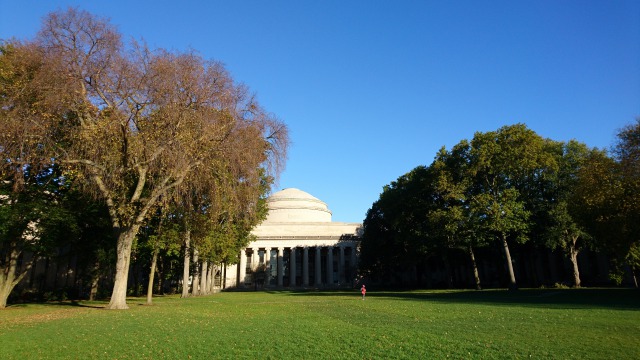
Tokyo Institute of Technology (Tokyo Tech) 's School of Engineering, School of Materials and Chemical Technology, and School of Environment and Society launched a unique academic student exchange agreement with a tuition waiver and credit transfer systems with Massachusetts Institute of Technology (MIT), Department of Nuclear Science and Engineering (NSE) in 2019, and completed the very first curriculum in January, 2020.
Program Overview
Participating students are in the final year of the bachelor course. MIT students stay in the 3rd and 4th quarters at Tokyo Tech, and Tokyo Tech students do an Autumn Semester at MIT. Although it is mandatory to take one required subject, it is possible to take whatever courses they like, and join a laboratory doing research under the supervision of the faculty. Besides, students can participate in cultural events and networking activities.
Background of the Program
This program was based on the departmental agreement concluded in February 2017 between MIT Center for Advanced Nuclear Energy Systems (CANES) and Laboratory for Advanced Nuclear Energy (LANE), Institute of Innovative Research, Tokyo Tech. They have been focusing on nuclear energy systems in general and cultivating exchanges among researchers and students. Eventually, a student exchange-specific program was launched in 2019 and the first batch of students completed the 5-month curriculum in January 2020.
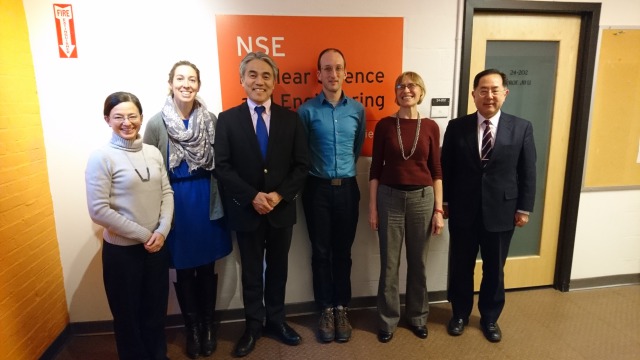
Meeting among the program coordinators at NSE, MIT on Dec. 15, 2019 Ms. Pilcavage (far left) MISTI Managing Director, Associate Prof. Short (third from right) NSE
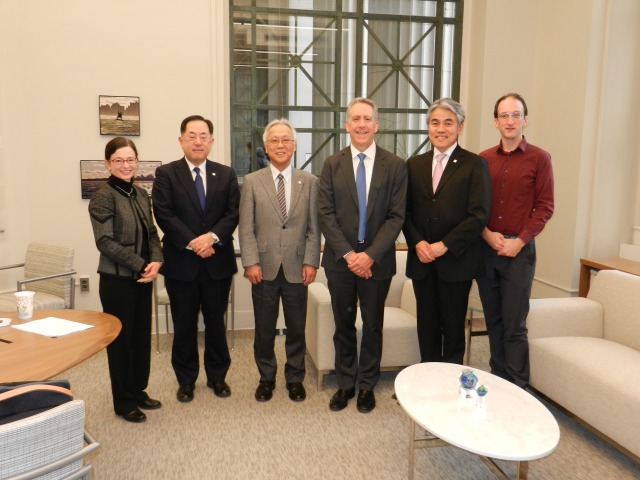
Holding a top-level talk at MIT on Feb.12, 2020 Prof. Waitz (third from right) Vice Chancellor, MIT Prof. Mizumoto (third from left) Executive Vice President for Education, Tokyo Tech
Testimonials from participating students
| Outbound student | Mr. Yaoki Sato |
| Affiliation at Tokyo Tech (At a time of participation) | Bachelor 4th Grade Dept. of Transdisciplinary Science and Engineering School of Environment and Society |
| Supervisors at MIT | (Academic Advisor) Prof. Michael Short (Research Supervisor) Prof. Benoit Forget |
| Courses |
|
| Research Topics | Uncertainty propagation of nuclear data for windowed multipole method |
Testimonials:
Lectures at MIT are tough indeed. It is mandatory to attend five hours of classes and do seven hours of assignments a week per subject. Additionally, I had a pile of reading up to do beforehand. To my astonishment, MIT students usually take five or six subjects. I was overwhelmed to take three subjects and conduct research work, but the gained knowledge will be worth it for sure. Gaining knowledge and persevering in whatever I did gave me confidence. The most important thing while you are participating in the study abroad program is to cherish your curiosity. At MIT, you will enjoy many learning opportunities, not only in your specialized field but in cultural activities. Furthermore, MIT has an air to cheer up students, and there are many chances for learning everywhere in town. In order to make use of these opportunities, curiosity is indispensable. Going outside and acting according to your curiosity rather than being sequestered in your room will lead to fruitful days. Fortunately, Boston is ideal for cultural activities. There are art museums and science museums near the campus and spots to learn American history in the heart of the town. Learn as much as possible and follow your interests, and your study abroad will be worthwhile.
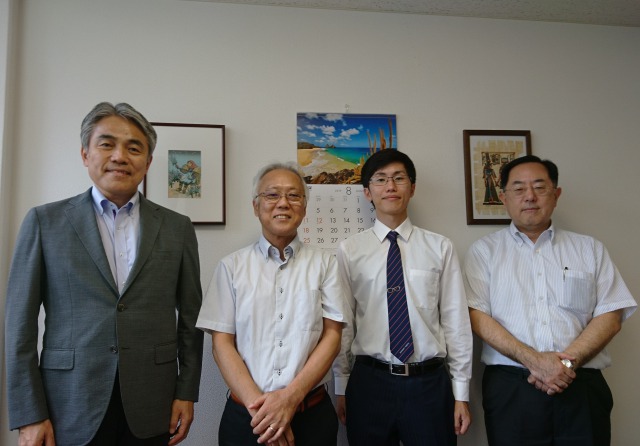
Sato (second from right) Send-off greetings to Prof. Mizumoto, Executive Vice President for Education (second from left)
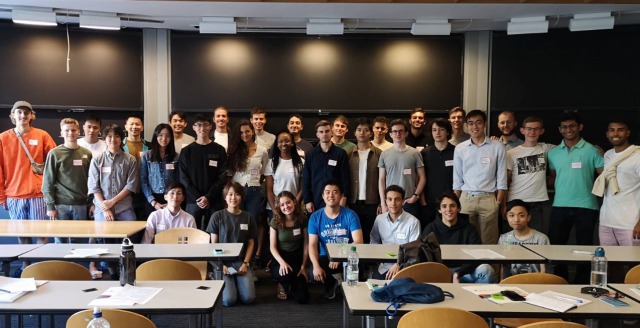
Sato (far left in front row) during the New Semester Orientation
| Inbound student | Ms. Eva Morgan Lisowski |
| Affiliation at MIT | Bachelor 4th Grade, Dept. of Nuclear Science and Engineering (NSE) |
| Affiliation at Tokyo Tech (At a time of participation) | Dept. of Transdisciplinary Science and Engineering School of Environment and Society |
| Supervisors at Tokyo Tech | (Academic Advisor) Prof. Toru Obara (Research Supervisor) Prof. Hiroshi Sagara |
| Courses |
|
| Research Topics | Nuclear Security and Non-Proliferation |
Testimonials:
- How do you like your lab activitie Because I was in Sagara Lab, my research activities mainly focused on Nuclear Non-proliferation. Specifically, I learned a lot about material attractiveness, or how to evaluate nuclear materials based on how attractive they are for nuclear weapons production and theft by non-state actors, such as terrorists. I really enjoyed attending lab seminar every week and learning about my lab colleagues' research progress and the latest news in Japanese nuclear non-proliferation research.
- How were your learning outcomes? (Research/ Course work I enjoyed many opportunities in class to learn about the Japanese perspective on nuclear energy, and I had many opportunities to improve my Japanese speaking ability. I would say that my learning outcomes were very successful!
- How do you like your experiences in Japan? I had many interesting opportunities to try different aspects of Japanese culture, such as Kyudo, autumn walks in Kamakura City, Ikebana-making (traditional flower arrangement), Osechi-ryouri (New Year dishes), tea ceremony club, karate club, and others. I was able to make many friends and learn about Japanese culture while practicing speaking Japanese.
- Do you expect any influences on your future career goals and choices through the program? In the future, I would like to be involved in US-Japan relations in the government or nuclear energy research.
- Why did you choose Japan to study abroad? Right now, Japan has a very interesting perspective on nuclear energy. Since the Fukushima disaster in 2011, nuclear energy power plants have been closing. However, due to energy security needs and clean energy goals, I believe nuclear energy is important to Japan. I wanted to learn more about this challenge and see how the United States and Japan can collaborate on nuclear energy research in the future.
- Why did you choose Tokyo Tech to study abroad? Tokyo Tech was the only Japan, nuclear engineering exchange program offered at MIT in the fall semester, so I did not have any other choices.
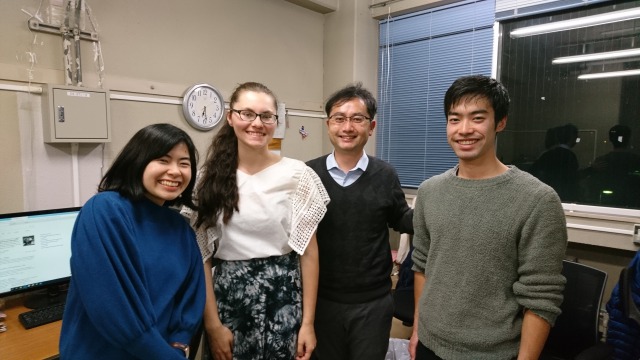
Eva (second from left) with her lab members and research supervisor Prof. Sagara (second from right)
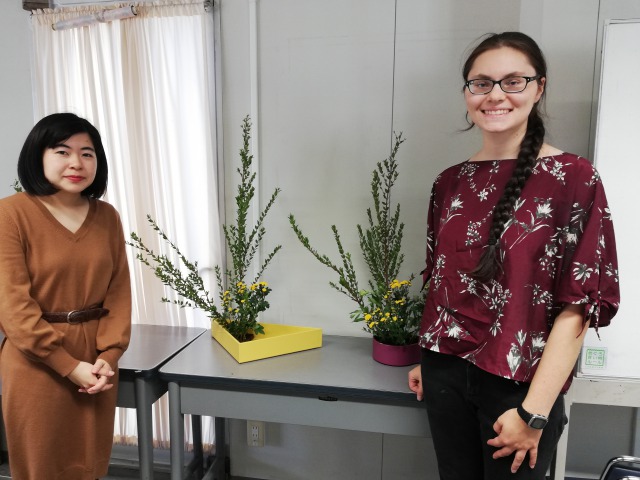
Ikebana Event held by Meguro International Friendship Association (MIFA)